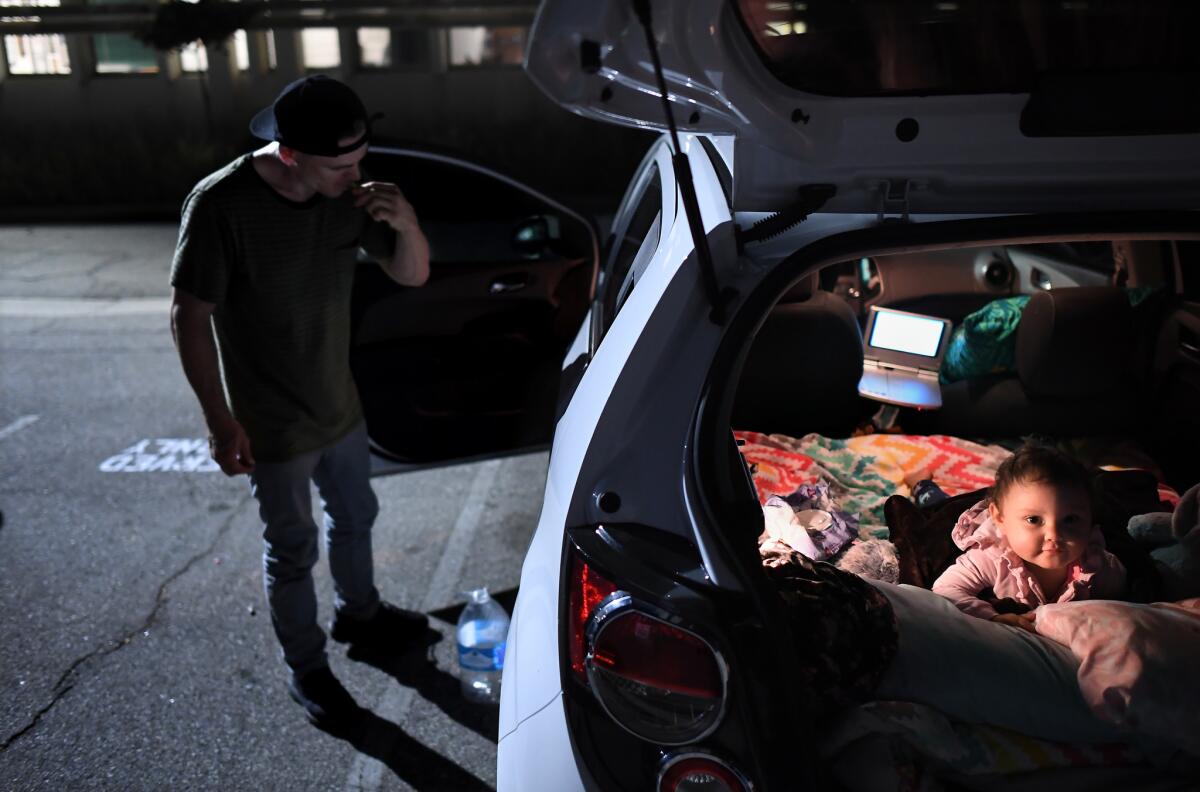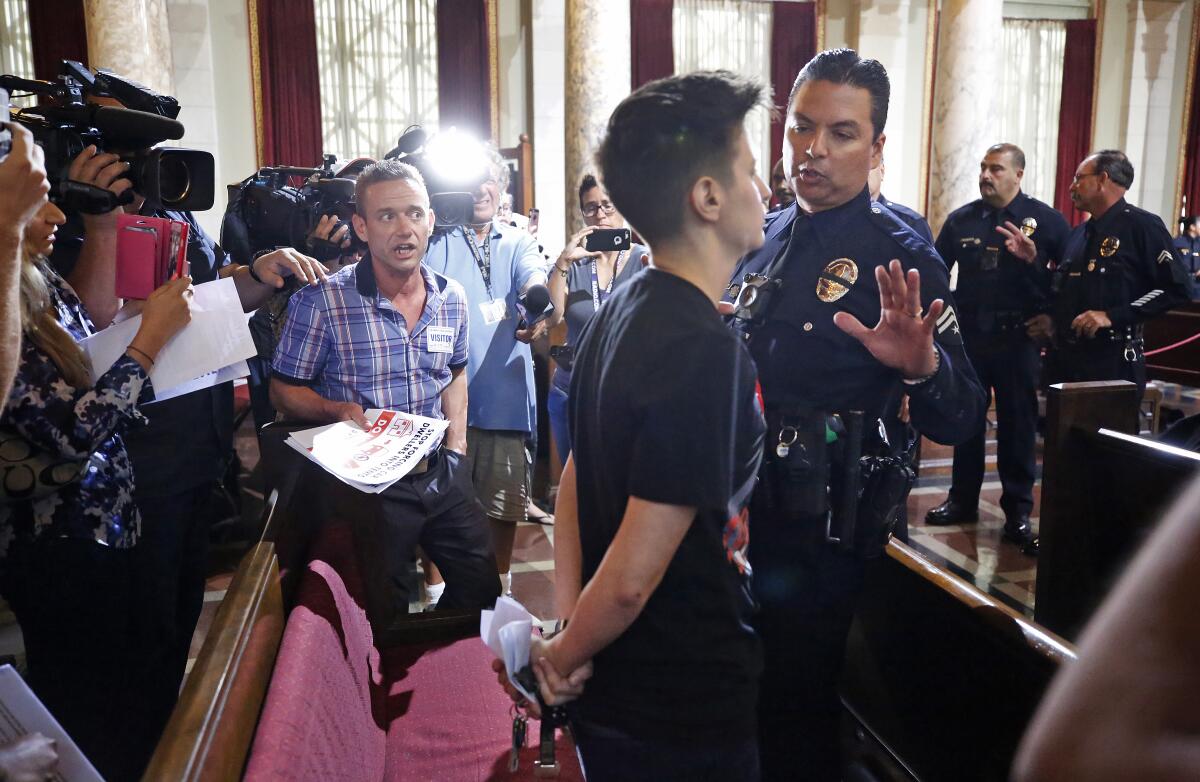L.A. City Council votes to reimpose limits on living in vehicles

- Share via
Sleeping overnight in cars, vans and RVs will be prohibited again in many parts of Los Angeles, after the City Council voted Tuesday to reinstate rules that limit where people can live in their vehicles.
The decision extends the L.A. regulations, which had expired at the beginning of July, until January. Under the rules, people cannot spend the night in their cars on residential streets, or live in their vehicles at any time within a block of a park, school, preschool or day care facility.
At a hearing at City Hall, local activists argued that it was cruel and counterproductive to punish people for bunking down in vehicles while housing, shelters and “safe parking” programs for homeless people remain inadequate. Despite the impassioned pleas from opponents, the council voted 13-0, without any discussion, to reinstate the rules.
Immediately after the vote, opponents began shouting in disbelief and anger, bringing the council meeting to a halt. Many in the crowd started chanting, “Shame on you!”

As police detained one person in handcuffs and ushered other activists out of the room, Councilman Marqueece Harris-Dawson briefly spoke to reporters, calling the rules “an attempt to strike a balance.”
Letting people park and sleep anywhere at any time would be “totally unacceptable” for neighborhoods, Harris-Dawson said. For instance, the councilman said that RVs lined up around one park have blocked parking and stopped residents from using the park. In letters to the council, some Angelenos complained about trash and filth from cars-turned-homes.
“When you have 30,000 people living on the street, there are no good choices,” Harris-Dawson said.
More than 9,500 people live in cars, vans or RVs throughout the city of Los Angeles, according to the last annual count. But the scattering of safe parking sites now operating across the city have capacity for fewer than 200 vehicles nightly — a number expected to rise to more than 300 in the fall, according to the Los Angeles Homeless Services Authority.
Renewing the rules is “endorsing the continued harassment and criminalization of those who sleep in their cars when they have no safer place to go,” said Kate Corry-Saavedra, a member of the homeless advocacy group KTown for All.
Council members Bob Blumenfield and Mike Bonin were absent for the Tuesday vote. A spokesman for Mayor Eric Garcetti said the mayor plans to sign the measure, which is expected to go into effect by the end of the week.
The L.A. rules were first passed nearly three years ago to impose new regulations after a federal court struck down a citywide ban on living in vehicles, calling it an invitation to discriminate against the poor.
Those restrictions were initially meant to be a stopgap measure while the city got “safe parking” programs up and running. They permitted vehicle dwellers to stay the night in industrial or commercial districts, but kept them out of residential neighborhoods where Angelenos had complained about scarce parking, trash and other nuisances tied to RVs.
But in the years since, the City Council has clamped down on overnight parking in many additional areas, imposing such restrictions street by street.
Many of the bans have been targeted specifically at “oversize vehicles” such as RVs. In the meantime, safe parking programs have been slow to get started.
The result is a “de facto ban on living in vehicles at a time when nearly 10,000 Angelenos have literally no other housing option,” said Shayla Myers, an attorney with the Legal Aid Foundation of Los Angeles.
At the Tuesday meeting, several people argued that vehicles provided shelter and safety to people who would otherwise be bedding down on the streets. Cue Jn-Marie, pastor of the Church Without Walls on skid row, said that “kicking people out of their car is a death sentence.”
Violating the vehicle dwelling rules is an infraction, punishable with a fine of up to $25 for the first offense, $50 for the second offense, and up to $75 for additional violations.
In a report last year, the Los Angeles Police Department said that 185 citations had been issued under the law between Feb. 6, 2017, and June 30, 2018 — approximately 10 citations a month.
In order to issue such a citation, police officers have to contact the person living in the vehicle and a violation can be “difficult to prove” when they cannot look inside because the person refuses to respond, the report said.
Despite those obstacles to enforcement, the lapse in the city rules had troubled some residents who argued that police needed the power to ticket RVs that park overnight in their neighborhoods. During that brief period, “vehicle dwelling everywhere was legal,” said Rob Wilcox, a spokesman for the city attorney.
“It has been a nightmare in Venice with people living in cars [and RVs] leaving trash and creating unsanitary conditions on our streets and sidewalks as well as taking away much needed parking,” Carol Katona wrote in a letter urging council members to reinstate the law. “Los Angeles will be a magnet for people from all over the country to come here and do the same. “
In his motion seeking to extend the restrictions for six months, Councilman Mitch O’Farrell said the city was still reviewing the rules and how they had been implemented and looking at ways to encourage communities to welcome safe parking programs.
The added time, he said in his motion, was needed to evaluate possible changes to the law.
Times staff writer Dakota Smith contributed to this report.
More to Read
Sign up for Essential California
The most important California stories and recommendations in your inbox every morning.
You may occasionally receive promotional content from the Los Angeles Times.











